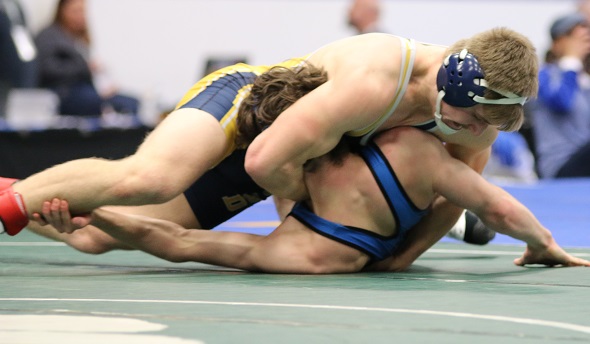
Gaylord Rules North, Seeks to Take State
December 6, 2018
By Chris Dobrowolski
Special for Second Half
GAYLORD — The town of Gaylord is surrounded on all sides by more than an hour of northern Michigan roads and landscape.
 But when it comes to high school wrestling, Gaylord is like an island.
But when it comes to high school wrestling, Gaylord is like an island.
Few wrestling programs in the northern Lower Peninsula are on par with the Blue Devils, who have made team success an annual occurrence and churned out elite individual performers year after year.
“Everyone who wrestles us, they know they’re going to get a battle,” said Gaylord head coach Jerry Lajoie, who is entering his 24th season leading the Blue Devils. “We’ve been to the state tournament several times — three or four times in the semis, a couple more times in the quarters and one time in the finals. Last year we put out two state champs and three other medalists. Not bad out of 14 weight classes for us.”
As good of a run as Gaylord has had in wrestling — the Blue Devils are working on a string of consecutive Big North Conference and District championships that goes back more than a decade and have won Regional titles in three of the last four years — last year was the program’s best. As a team, the Blue Devils advanced to the Division 2 championship match for the first time and had Chayse Lajoie and Derek Giallombardo reach the pinnacle of the Individual Finals at Ford Field, winning championships at 112 and 125 pounds, respectively. Gaylord had five others qualify for the Individual Finals, with Joe Markham third at the 285-pound class, Jacob McKnight fourth at 140 and Cade Foster sixth at 171.
“It was a great environment to be in,” said John Sosa, who was among Gaylord’s seven individual state qualifiers in 2018 and a Finals placer as a freshman in 2017. “Everybody wanted to be there. Everyone put in 110 percent, and it showed at the end of the year when we were in the state finals match. Everyone was willing to work. I could pick anyone in the room and everyone would give 110 percent, which I very much appreciate.”
The Blue Devils are motivated by last season’s 43-17 loss to five-time reigning Division 2 champion Lowell in the Final and are hoping to replicate their trip this winter, with perhaps a different result in the last match.
“We’ve got a team that I think we can get back to team states with,” said Jerry Lajoie. “We’re going to be focusing on winning conference, then Districts and Regionals. Once you get (to the Finals), you never know what can happen.”
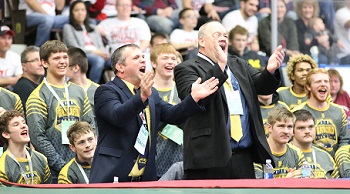 The challenge will be replacing seniors like Giallombardo, Markham and 160-pound individual qualifier Nick Brewster. This year, more than half of the 33 grapplers on the roster are freshmen. That prevalence of youth doesn’t faze a veteran coach like LaJoie.
The challenge will be replacing seniors like Giallombardo, Markham and 160-pound individual qualifier Nick Brewster. This year, more than half of the 33 grapplers on the roster are freshmen. That prevalence of youth doesn’t faze a veteran coach like LaJoie.
“We just had this discussion when we had a meeting on Wednesday — we’re starting a lot of young kids,” he said. “I said, ‘I don’t care if you’re a freshman or not. Expectations are the same. We’ve had freshman state champions. Why not you?’”
The Blue Devils are fortunate to be able to lean on veteran leadership while they get their younger group ready to compete at a high level. Foster is back as a senior to handle the 171 or 189-pound division, and the junior class led by Chayse Lajoie, who can wrestle anywhere from 119 to 130, Sosa (125 or 130) and McKnight (152 or 160) is strong and figures to rack up a lot of wins over the next few months.
“I’m just hoping our team can push through and make it to states again, and hopefully contest for the state championship again,” said Chayse Lajoie, the most accomplished member of the squad as a two-time MHSAA individual champion as well as a Junior Greco-Roman national champ at 120 pounds. “We’re just trying to get everyone together right now. Towards the end of the season we’ll start focusing on that. We kind of take things step by step.”
Hard work is the most common response the Blue Devils give when asked what it takes to become an exceptional wrestler, and that helps explain Gaylord’s success – there’s no shortage of work ethic in Gaylord’s wrestling room. Lajoie demands that and dedication, though he also makes sure wrestling is fun for his team, too. With all of those factors in the equation, he doesn’t have much trouble getting his squad to meet the expectations of the program.
“Kids are probably the best judge of character out of anybody. More so than adults,” said Lajoie. “They figure out if you care about them or not. And if you do, they’ll buy in.”
It doesn’t take Gaylord’s wrestlers long to realize their coach is willing to put in just as much time as they do, creating a mutual respect that strengthens the bond between coach and athletes.
“He’s a great guy,” Sosa said of Lajoie. “Very appreciative that we can give him our time. He says, ‘If you give me your time, I’ll give you mine.’ Very knowledgeable on and off the mat. You can call on him any time of the day, and he’ll help you out.”
The end result is what has become a wrestling dynasty in northern Michigan, built from the youth level up with a group of kids who take pride in being from Gaylord and everything for which the wrestling program stands.
“We only have so many kids to choose from, and no one in our area,” said Jerry Lajoie. “You can’t move five minutes and go to a different school. That’s where our badge of honor is. We’re up here, we’re all local boys — let’s go battle.”
 Chris Dobrowolski has covered northern Lower Peninsula sports since 1999 at the Ogemaw County Herald, Alpena News, Traverse City Record-Eagle and currently as sports editor at the Antrim Kalkaska Review since 2016. He can be reached at [email protected] with story ideas for Manistee, Wexford, Missaukee, Roscommon, Ogemaw, Iosco, Alcona, Oscoda, Crawford, Kalkaska, Grand Traverse, Benzie, Leelanau, Antrim, Otsego, Montmorency, Alpena, Presque Isle, Cheboygan, Charlevoix and Emmet counties.
Chris Dobrowolski has covered northern Lower Peninsula sports since 1999 at the Ogemaw County Herald, Alpena News, Traverse City Record-Eagle and currently as sports editor at the Antrim Kalkaska Review since 2016. He can be reached at [email protected] with story ideas for Manistee, Wexford, Missaukee, Roscommon, Ogemaw, Iosco, Alcona, Oscoda, Crawford, Kalkaska, Grand Traverse, Benzie, Leelanau, Antrim, Otsego, Montmorency, Alpena, Presque Isle, Cheboygan, Charlevoix and Emmet counties.
PHOTOS: (Top) Gaylord’s Cade Foster works toward a pin during last season’s Division 2 Semifinal win over Warren Woods Tower at Wings Stadium. (Middle) The Blue Devils, including coach Jerry Lajoie (left), cheer on a teammate. (Click to see more from HighSchoolSportsScene.com.)
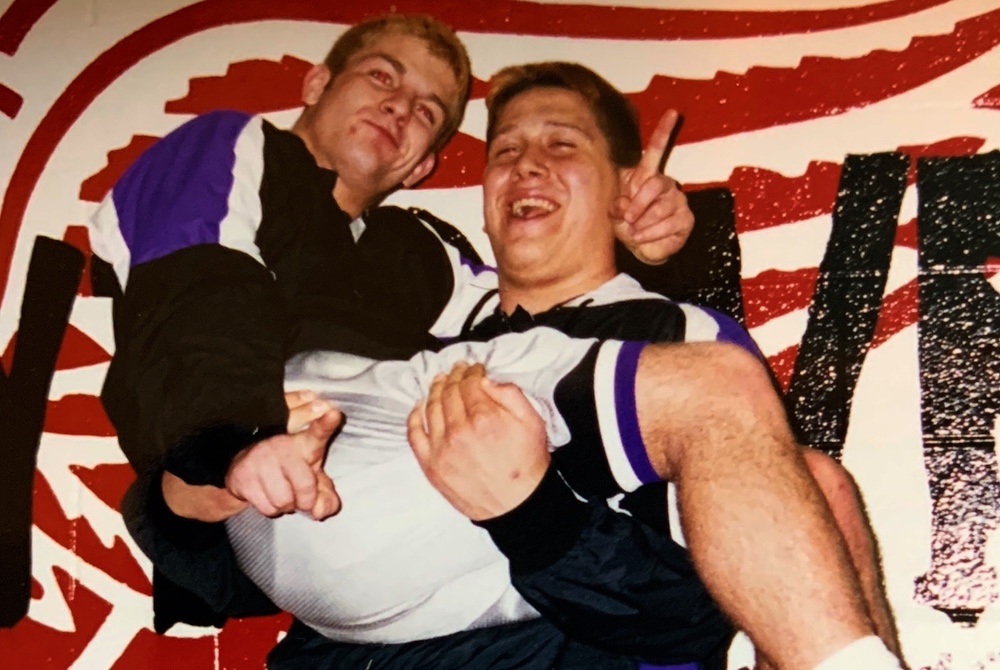
Caro Champs Find Common Ground Again as Mental Health Providers
By
Paul Costanzo
Special for MHSAA.com
July 8, 2021
Phil Millerov and Phil Niklowicz wanted to do more than simply defeat opponents when wrestling at Caro High School.
They wanted to dominate – physically and mentally.
 “We had this thing between us where we wanted to be done, and (opponents) didn’t want to come back on the mat with us,” Millerov said.
“We had this thing between us where we wanted to be done, and (opponents) didn’t want to come back on the mat with us,” Millerov said.
Twenty years later, both spend their days building people up. Millerov is a licensed professional counselor, while Niklowicz is a licensed therapist.
“I went out there looking to dominate and make sure it was known that I am the superior wrestler in all facets,” Niklowicz said. “I would try to run up as many points as fast as I can. I would teach the same thing when coaching, specifically with my nephew. You’re saying, ‘Listen, we want to break these people.’ Then the next day, in a therapy session, it’s like, ‘Let’s build up your self-esteem and set some goals to boost ourselves up.’”
The close friends and two faces of Caro’s surging wrestling program in the late 1990s now have very similar careers. Millerov – who finished second, third and first at 275 pounds in the 1998, 1999 and 2000 MHSAA Finals, respectively -- works in private practice at Transitions Counseling Service in Greenville, where he specializes in substance abuse disorders. He also has served as a Class 1 Fellow at the WK Kellogg Foundation.
Niklowicz – a two-time MHSAA Finals champion (1999 and 2000) and four-time placer – is working in private practice in Southfield, seeing mostly children. He also works in adult foster care with patients who have had traumatic brain injuries.
“He and I went and hiked Pictured Rocks at the beginning of May,” Millerov said. “And we joked about how nobody would have guessed that we’d be doing this now.”
That Millerov and Niklowicz are still close does not come as a surprise. Their friendship began when their wrestling careers did, as 6-year-olds in the Caro Growlers program. As they were becoming two of the state’s top wrestlers, they would share rides to tournaments, and their families grew close.
In high school, despite their size difference – Niklowicz wrestled at 135 his senior year – it wasn’t uncommon to see them warming up together.
“We were definitely easy going and liked to mess around a lot,” Niklowicz said. “We used to mess around before meets and throw each other. He would jump and I would throw him. People would look at us like, ‘Why is that little guy throwing that big guy?’”
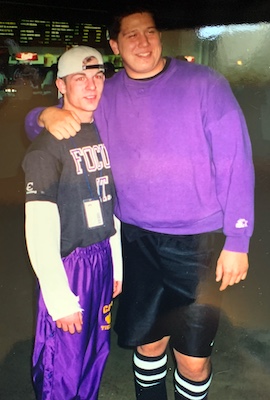 While their teams never made it out of the Regional, Millerov and Niklowicz helped set the stage for a program that would become among the best in Division 3 throughout the 2000s, qualifying for five straight Quarterfinals from 2003-07 and winning the Division 3 Finals title in 2003.
While their teams never made it out of the Regional, Millerov and Niklowicz helped set the stage for a program that would become among the best in Division 3 throughout the 2000s, qualifying for five straight Quarterfinals from 2003-07 and winning the Division 3 Finals title in 2003.
Individually, they were among the most well-known and feared wrestlers in the state.
“Niklowicz and I were fortunate to have each other, because we pushed each other,” Millerov said. “We were in constant competition with each other and ourselves. Just to kind of push each other, it was a great thing.”
Niklowicz finished fifth as a freshman and third as a sophomore before winning back-to-back titles to close out his career. In 1999, he defeated Nick Oertel of Goodrich 9-2 in the 125-pound final, and the next year he defeated Oertel’s teammate, Ryan Tripp, 7-5 at 135. Tripp would go on to win an individual title the following year. Niklowicz would finish his career with 214 victories.
“I think probably both (Finals titles) were equal,” Niklowicz said. “I think there was probably a little more stress going into my senior year. My motivation always came from improving, then it was maintaining the state title. You don’t want to go the opposite direction.”
Millerov lost a tight 6-4 decision against Remus Chippewa Hills’ Bob Kozlowski in the MHSAA Finals as a sophomore, and had an epic 12-10 match against future NFL defensive lineman Jason Babin of Paw Paw in the 1999 semifinals before fighting back to take third. The next year, he won his title via first-period pin against Dan Kliphuis, a two-time runner-up from Grand Rapids West Catholic. Millerov finished with 196 career wins and set the state record for pins in a career (160), which was broken the next season by Nick Simmons of Williamston and is now held by Justin Zeerip of Hesperia. The 56 pins Millerov recorded his senior season remains second all-time to Simmons, who had two seasons with 57.
“I never really thought about (the pin record) to be quite honest,” Millerov said. “It was just kind of in the background. It didn’t matter; all I cared about was winning this match, and I wanted to do it in the most effective, efficient way I could.”
They both continued their wrestling careers, but went their separate ways in college, with Millerov heading to Neosho County Community College in Kansas and Niklowicz to Virginia Tech.
Millerov had interest from several Division I schools coming out of high school, including some in the Big Ten, but he admits his grades weren’t good enough at the time. Neosho provided a chance to compete with some of the best in the country while at the junior college level, however, as the team took second at the National Junior College Athletic Association championships in 2002.
He transferred to Central Michigan after his sophomore year, joining his girlfriend – now his wife – who was already attending, and walking onto the wrestling team. While his relationship lasted, wrestling did not.
“I was distracted,” Millerov said. “My grandmother passed away in 2002 in that summer. I was trying to get that motivation back, and I just lost it. There has to be that edge with wrestling. When things didn’t work out, I struggled. Wrestling was my identity.”
Millerov was working to follow in his father’s footsteps and become a police officer. But the elder Phil Millerov, who died in 2012, talked his son out of it.
“Looking back on it, for me, it was obviously the right decision,” Millerov said.
The idea to go into counseling came after Millerov was married in 2006, as his wife had gotten into the program. He went back to school to earn his bachelor’s degree from CMU in 2007, and would go on to get his master’s from CMU, as well.
“I had taken a bunch of psychology courses just because I liked the field,” Millerov said. “I liked to be challenged. I liked puzzles, and with psychology, it’s like a new puzzle every hour. It just clicked. I flew through and graduated with like a 3.8. I was like, ‘Wow, I kind of feel smart.’ It was good to find something I was passionate about again.”
Millerov said he’s constantly learning and honing his craft, much like he did as a wrestler. A major difference now, however, is that he’s found more balance in his life.
“I think about working with athletes in addiction, I find a lot of similarities,” he said. “Wrestling was my life, it’s how I identified myself. I hear that same kind of talk around people struggling with addiction. One you’re considered successful for, the other you’re not. Most of my growth has been around finding balance. I find that my happiness and my clients’ as well, is when we found that balance instead of being good at just one thing. I want you to have passion, I want you to do things you love, but I also want you to be effective as a husband, a father, whatever other responsibilities you have.”
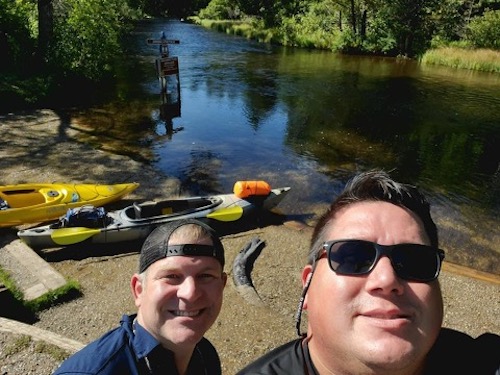 Niklowicz’s journey to becoming a therapist was more telegraphed, as both of his parents work in mental health, and he said it was always something he wanted to do, as well.
Niklowicz’s journey to becoming a therapist was more telegraphed, as both of his parents work in mental health, and he said it was always something he wanted to do, as well.
He attended Virginia Tech on a wrestling scholarship, but transferred to Eastern Michigan after one year. The Hokies had recruited him to wrestle at 133 pounds, but when the team’s 125-pounder was injured, Niklowicz was asked to cut down further. Like Millerov, he struggled when his wrestling career ended.
“I just had a really bad taste in my mouth after leaving Virginia Tech and trying to cut all this weight,” he said. “Some of it was I had lost the desire to work out, to wrestle. Fifteen years, roughly, of my life was dedicated to wrestling, and once you stop, what do I do with my winters? What do I do with seven months of the year? It was definitely a part of my identity; that’s why I got into coaching. I did MMA fighting for a little bit to have something competitive.”
Like Millerov, Niklowicz said finding balance was important.
“In the mental health field, specifically, there’s a lot of burnout for people,” he said. “Every day, you’re listening to people talking about their problems, but at the same time, they’re coming for a reason and they’re there for help, so you have to provide that help and have to motivate yourself to come to the office every day and give it your best. I try to instill the motivation that I used to other people.”
When Niklowicz looks at his time as an athlete compared to his work as a therapist, he said that work ethic is the main characteristic that has carried over.
“I think my practice mentality was the same as it was on the mat,” he said. “Even in the wrestling room, these are people I’m friends with, people I grew up with, and I still didn’t want anyone to score on me. Then you just look at your work ethic outside of wrestling, whether you’re studying for exams or motivating yourself to get up and go to class.”
While they are no longer living in the same town or living similar lives – Millerov is married with three kids, while Niklowicz is single – the connection between Caro’s dominant duo remains strong, both professionally and personally.
“I don’t think we ever thought we would be going down such a similar path, and I doubt that either one of us grew up thinking we would do the exact same thing,” Niklowicz said. “We met when we were 6 years old, and we’ve been best friends forever. I think it’s hilarious that we’ve taken such similar paths but with some glaring differences. It’s definitely interesting that we’re still really good friends after 30-some years, especially since we’ve moved on and gone our separate ways.”
2020-21 Made in Michigan
June 28: Michigan's Minor Leaguers Making Up for Lost Season - Read
PHOTOS: (Top) Caro’s Phil Millerov lifts teammate Phil Niklowicz as both celebrate Division 3 championships during the 2000 Individual Finals at Joe Louis Arena. (Middle) Niklowicz, left, and Millerov were high school warm-up partners despite wrestling at significantly different weights. (Below) Niklowicz and Millerov take a selfie during a hiking trip to Pictured Rocks National Lakeshore in May. (Photos courtesy of Niklowicz and Millerov.)

